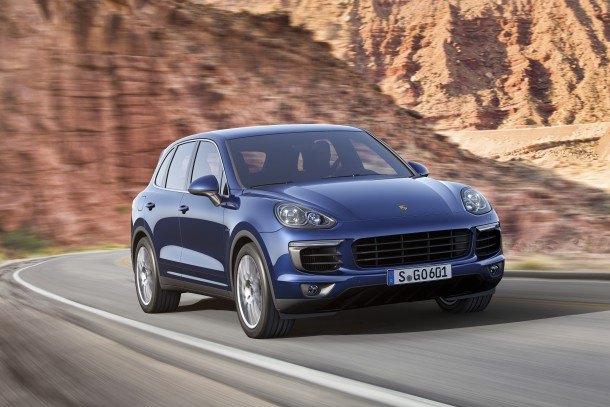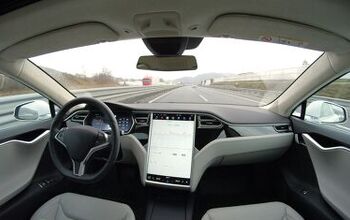UK City Signs Off on Diesel Ban, Leaving Thousands With Second-class Cars

It’s not just the increased taxation on diesel fuel that’s prompting Europeans to throw in the towel on compression ignition. Look to local lawmakers for Reason Number One why diesel, which just a few years ago comprised the majority of new car sales in the UK, is suddenly less popular than this writer was in high school.
Following similar moves by select German cities and other jurisdictions, the UK city of Bristol has become the first municipality in that country to approve a diesel ban, with fines set to be levelled against anyone caught entering the city with a non-spark engine. Amazingly, this motley crew of second-class vehicles includes transit buses.
The decision by Bristol city council wasn’t a spur-of-the-moment thing, nor was it entirely its decision to make. With some of the highest nitrogen oxide levels in the country, Bristol had been ordered from on high to “do something” — and when you ask politicians to do something, and do it right now, they usually come down with a hammer.
As the quickest way to alleviate smog is to get rid of its sources, council approved a ban on diesel-powered vehicles in the city core (“central ban zone”) from 7 a.m. to 3 p.m., with anyone caught violating the perimeter hit with a nine-pound fine, BBC reports. Pending federal approval (the UK government will require legislation to make the ban legal), the ban is expected to go into effect in 2021.
Other cities, including Birmingham and London, could soon follow Bristol’s lead.
A wider “clean air zone” surrounds the central ban zone, and it’s this wider perimeter that owners of diesel-powered cars and trucks will have to pay to cross, not just the central area. Operators of heavy trucks and buses will face a daily charge of 100 pounds ($129) per vehicle, should they cross this line. Taxis and private cars would pay $11.60 per day.
Ever-vigilant plate recognition cameras would ensure no one gets through untaxed.
Interestingly, but perhaps not surprisingly, little in the way of information was provided about how the city would mitigate the resulting increase in costs borne by its residents. Lip service was provided, though. Heavy trucks deliver goods, and fees imposed on the transportation of those goods are reflected in the final purchase price of the goods being delivered. Transit services would similarly have to impose a higher fare on bus riders, at least in the absence of some kind of government subsidy.
In Bristol’s defense, a number of issues relating to the plan have yet to be ironed out.
“Protecting the most vulnerable people from pollution is central to these plans and we have ensured that all impacts have been carefully considered. If approved, mitigation measures will support those most affected, especially those living in the most deprived communities,” said Mayor Marvin Reeves, without elaborating on what those measures would be.
Stating “It’s hard to overstate how significant a policy intervention this is,” BBC Radio Bristol politics reporter Pete Simson remarked, “This is a first, no other UK city is introducing an outright diesel ban, and it will require the government to introduce new legislation.”
Indeed, some feel the ban goes too far. Alan Peters of local bus company Abus called the move “excessive,” claiming his company would need to spend $1.25 million pounds to upgrade vehicles on routes entering the ban zone.
“They should be encouraging the use of buses rather than increasing the cost,” he said.
Industry groups weren’t pleased to hear of the move, either. As reported by Autocar, Society of Motor Manufacturers & Traders CEO Mike Hawes said “this proposed blanket ban, which goes against government’s guidelines, fails to distinguish between modern vehicles and decades-old technologies and will only cause confusion for drivers while also undermining efforts to boost air quality.”
Automotive services company RAC, Britain’s equivalent of AAA, suggested drivers of diesel vehicles would find other non-targeted routes into the city, leading to congestion in otherwise traffic-sparse neighborhoods, offsetting the clean-air gains the city hopes to achieve. Not only that, owners of said vehicles might find themselves locked into a financing contract on a vehicle they can no longer get much use out of. Others might be unable to afford a new, non-diesel car.
With municipalities across Europe increasingly looking to diesel and even blanket internal combustion bans to reduce air pollution and lower greenhouse gasses, it’s no wonder diesel drivers are nervous.
According to the European Automobile Manufacturers Association, demand for diesel passenger vehicles fell by 16.4 percent, year over year, in the second quarter of 2019. Across the EU, diesel’s market share now stands at 31.3 percent.
[Image: Murilee Martin/TTAC, Porsche]

More by Steph Willems
Latest Car Reviews
Read moreLatest Product Reviews
Read moreRecent Comments
- Jeff “So, the majority of our products are either ICE vehicles or intended to utilize those multi-energy platforms that we have. This is a great opportunity for us, compared to our peers, having the multi-energy platforms for all of our products in development and having the agility to move between them,” she said. From what is stated about the next generation Charger it will be released as a 2 door EV and then as a 4 door with the Hurricane turbo straight 6. I assume both the 2 door and 4 door is on the same platform.
- Brendan Duddy soon we'll see lawyers advertising big payout$ after getting injured by a 'rogue' vehicle
- Zerofoo @VoGhost - The earth is in a 12,000 year long warming cycle. Before that most of North America was covered by a glacier 2 miles thick in some places. Where did that glacier go? Industrial CO2 emissions didn't cause the melt. Climate change frauds have done a masterful job correlating .04% of our atmosphere with a 12,000 year warming trend and then blaming human industrial activity for something that long predates those human activities. Human caused climate change is a lie.
- Probert They already have hybrids, but these won't ever be them as they are built on the modular E-GMP skateboard.
- Justin You guys still looking for that sportbak? I just saw one on the Facebook marketplace in Arizona



































Comments
Join the conversation
Typical idiot European politicians, of which we currently have a lot to deal with. The reason we bought diesels in the first place was because governments encouraged us to due to their lower CO2 emissions and better fuel economy. Now, these same politicians which hysterically encouraged us to buy diesel cars want them banned and are promoting EVs (while ignoring the environmental pollution and human misery they create in the countries in which the raw materials for their batteries are mined). All this talk about ‘clean air’ in cities does not make sense to me when Europeans are world champions in public cigarette smoking. In fact, when I am traveling through my city on foot I am not bothered by the smell of modern gasoline/diesel cars - which I can hardly smell at all. But I am bothered by the people who pass me on foot, on bicycles or on these new E-scooters who happen to be smoking. If hypocritical European politicians are serious about clean air in cities, then I expect a radical ban on public smoking and hefty fines for those who caught doing it. Because like unfiltered automobile exhaust, cigarette smoking is extremely damaging to human health.
This ban is a Massive Attack by the city of Bristol against citizens rights. But that's okay - continue to elect idiots to represent you.